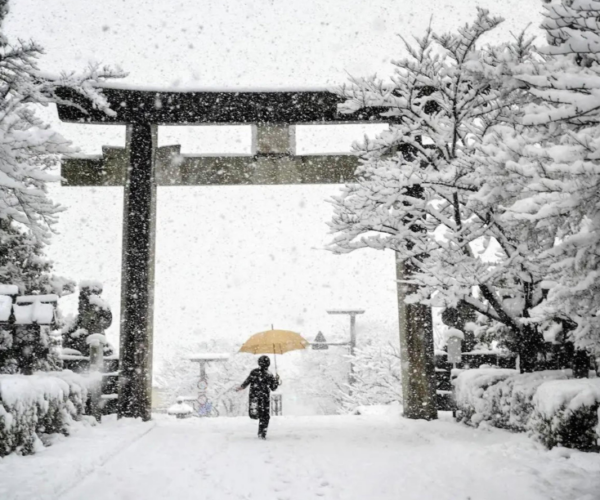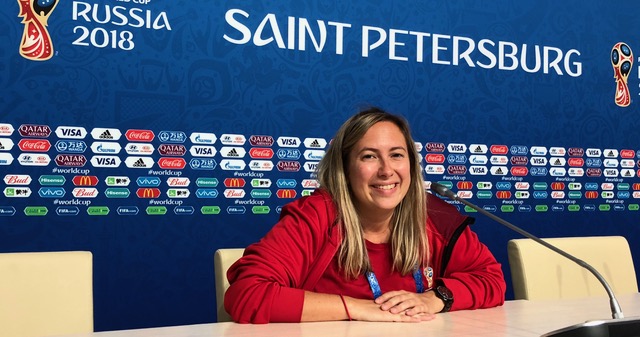Please introduce yourself and where you’re from!
Hi! My name is Amelia Hagen. I grew up in Virginia Beach, Virginia, USA but have called Tacoma, Washington, and the greater Seattle area “home base” since 2002. I also spent both high school and undergraduate school on the East and West Coasts so feel at home in both places.
Where and what did you study?
I earned a Bachelor in Business Administration with an International Emphasis, and a Minor in History from the College of William and Mary in Williamsburg, Virginia. Following my time on JET, I moved to the UK to get my MSc in International Event Management and then to northern Italy to get my MBA with a focus on Organizational Leadership and Personal Development from the University of Iowa’s satellite business program in Italy. I actually heard about this last degree opportunity via the JETwit jobs board.
Where were you placed on JET and for how long?
I spent five glorious years in Kitakyushu, Fukuoka from 2008 to 2013, employed through the Kitakyushu City Board of Education. I taught primarily at two junior high schools as an ALT, and was lucky enough to teach at one of them for all five years. While I’ve never heard of Kitakyushu before I was placed there, upon Wikipedia-ing it, I learned that two of its sister cities are Tacoma, WA and Norfolk, VA, which is right next to Virginia Beach. Since I was from two of Kitakyushu’s sister cities, there were countless times when I met Japanese people who had been to both of my “old stomping grounds”. On my first day at one school, somehow knowing about my university, my principal wore the William and Mary tie he bought when he visited William and Mary, which is not far from Norfolk, as part of a sister city delegation. Imagine my surprise when he proudly showed it to me!
What is your current career?
I teach on, organize, and execute educational initiatives, events, and programs promoting youth diplomacy, leadership, and entrepreneurship. I’ve supported student enterprise development in the UK and worked within an American business study abroad program in Italy over three years, and then in Kyrgyzstan and Kazakhstan, where I taught a range of courses from Design Thinking to Event Management to Leadership within university business schools. During the last few summers, I have served as an In-Country Director for the International Scholar Laureate Program in China, where I worked with the JET alum friend who told me about the job in the first place, and also as a trainer for the US Embassy in Riyadh-sponsored Saudi Young Leaders Exchange Program. More recently, I accepted an offer to join the Swiss Institute of Management and Hospitality in Weggis, Switzerland, as their new Deputy Director of People Development and Events…but we’ll see if I can make it there in light of the pandemic. As all JETs know, it’s important to remain flexible!
What were some memorable experiences you had on JET and/or how did the JET experience as a whole shape you to who you are today?
While in Kitakyushu, I had the pleasure of being around a lot of super creative people – fellow JETs and Japanese people alike. Thus, many of my experiences are thanks to their enthusiasm around adventures. One time that forever sticks out is when eight of us went to the Saijo Sake Festival outside of Hiroshima. We had matching t-shirts, and were paired into teams to do a scavenger hunt during the event. One friend wrote the scavenger hunt tasks in English, had them translated into Japanese on the back of the sheet, and then laminated them for us to wear around and show Japanese people to explain what we were doing. We made loads of friends in the process and it definitely enhanced our sake fest experience!
In addition, we organized the Kitakyushu Open, a pseudo-golf tournament around Kokura, the downtown area of Kitakyushu where I lived, and even dressed the part. I would be remiss if I didn’t mention participating in the JET alum-created Tokyo Yamathon, raising money for charity and then walking around to visit all 29 stations along the Yamanote Line, as well. Our team of four won the Spirit Award for our high energy and for coming from the farthest away to participate. Before several of us left Japan, we even held the Kitakyushu Awards, voting on and acknowledging our favorite memories over the years.
Although my time with fellow JETs often left me in tears from all the laughter, my fondest and most impactful memories came when I was fully immersed in Japan. The first few years I attended free weekly Japanese classes at the University of Kitakyushu. These were taught by university students who were interested in a.) connecting with the international community and/or b.) potentially teaching Japanese to non-Japanese. As a newbie and as someone who arrived with zero Japanese, I made good friends and learned an incredible amount about Japan during those evenings. Additionally, I loved Sports Day, when I practiced and learned the J-pop dance the third grade girls always did to perform it with them. And yes, I wore the school PE uniform and waved the bright pink pom-poms, too. It was another chance to get to know them better and genuinely feel like part of the school in front of everywhere. I think the other Japanese teachers got a kick out of it, too.
An Italian friend once said to me, “Your eyes sparkle when you talk about Japan.” Looking back, I think so much of the happiness and meaning I attribute to my time in Japan is thanks to the people I spent time with at school every day and the relationships I formed with them. Throughout my later JET years, I spent coffee breaks with the office staff, learning about their children, swapping stories, and having them proofread my Japanese. The staff at one school invited me on their weekend trip to Hirado, Nagasaki. On my last day at school before leaving JET, following a final lunch out at a restaurant, they surprised me with a birthday cake as they knew my birthday was later in the month and they’d miss it. One JTE even joined me for my final meal in Japan, breakfast no less, at Ichiran before seeing me off. I know my Niagara Fall-esque goodbye speeches reflected our mutual kindness, respect, and trust.
Along with all of this fun and excitement, came positive learning, growth, and development. I felt like I became an adult in Japan. I lived alone for the first time and had to figure out how to get an air conditioner, cell phone, and internet access without any Japanese in the beginning. I was problem solving at every level, at times subconsciously. I think this has later manifested in my tendency to always look at how something can be better, how it can be improved – again that Japanese concept of kaizen, or continuous improvement. Kaizen underscores my approach to any project, whether its teaching, training, planning events, or risk management for programs abroad.
Lastly, I’d say that I’ve been extremely curious from a young age (just ask my mom!). Both travel at an early age and studying abroad on Semester at Sea made this match stick fire of curiosity about the world burn bright. In turn, my time on JET lit that burning match into a bonfire. As I JET, I traveled more in and outside of Japan, I listened more, and I connected more. I continue to be fascinated by learning about the world around me, how I can make it a better place, and in particular, how I can help young people develop their global mindsets and purposes.
How did JET help you in achieving your current career pathway or any professional endeavors?
In many ways, the JET experience opened up chances for me to pursue new interests and purposes. The opportunities were there but it was up to me to seize and harness them. At the time, I realized it was a lot of work but I truly had no idea how they would shape my future.
In Japan, I discovered that I was passionate about organizing events. I served as an Event Coordinator and President of Fukuoka AJET and this morphed into two years on National AJET as Block 10 Rep for Northern Kyushu and Treasurer. Outside of AJET, I began planning my own events within the JET community with the most well being “The Shinnenkai” in Tenjin, Fukuoka. Held on the third Saturday in January, this event originated in small girls-only dinner parties I organized simply because my own immediate JET community was mostly male and I wanted to make friends with girls. By the time I organized this a fourth and final time, the event had grown to over 100 people from across Kyushu and southern Honshu. My favorite aspect of this “work” was bringing together and connecting people from so many different places. I then decided to explore further education in event management and took other JETs’ advice to study in the UK for a different, enriching – and cheaper! – educational experience.
Simultaneously, due to this passion for events, I got very involved in the TEDx community in Japan and was one of only two non-Japanese members of the core team that organized the first TEDxFukuoka. I subsequently jumped over to TEDxTokyo, helping remotely and then in person on the day of the event. Since then, I’ve contributed to over a dozen TEDx events in the UK, Italy, the US, and Kyrgyzstan. Last year, I organized TEDxAUCA, the first bilingual TEDx event in Kyrgyzstan, at the American University of Central Asia.
On a slightly different note, the teaching, facilitation, and training skills I have now are rooted in my time as an ALT and the professional development/presentation opportunities I optimized. The times I presented at Tokyo Orientation, Fukuoka Skills Development Conferences, and at local demonstration classes forced me to improve my ability to present in front of others. Prior to JET, I hated public speaking and now it feels completely comfortable. I learned that classroom management techniques can *generally* be applied across age groups and these have come in handy when leading project management sessions for exchange programs and professional development training sessions for young adults. This same comfort has allowed me to inject even more humor into my courses, facilitating good rapport with my program participants and students.
Most importantly, simply the variety of my experiences on JET sparked my creativity. I never thought I was a creative person. I couldn’t draw or play a musical instrument. However, my varied experiences, during and since JET, have been a sudden source of inspiration and creativity, empowering me to draw connections between otherwise dissimilar things and devise more innovative solutions to problems – whether they are interpersonal, strategic, logistical, etc.
Do you have any advice for JETs who might be looking into a similar pathway after their time on the program?
There are essentially “three and a half” pieces of advice that immediately come to mind. First, take advantage of every opportunity you come across during JET and utilize your time well, most especially if you are an ALT and you do not want to be an English teacher long term. Be constantly thinking about how you can develop new complementary skills and how you can employ them after JET in a way that you find fulfilling. Instead of complaining about having to present at your local skills development conference, consider how you might be able to leverage that experience in the future and then put in the work to make your contribution stand out. Whether you’re in an urban or rural area, there are so many ways in which you can build your skillset in person and virtually, but you must be proactive. Do not wait until right before you’re finishing on JET to reflect on your ikigai, and address any gaps in your skillset you need to make your next professional steps happen.
Second, look for and identify mentors. I always advocate that JETs create their own personal Board of Directors, anywhere from 2-4 people who can guide you and help keep you accountable. JET alumni and JETAA chapters are a great place to start. Use LinkedIn and JET Facebook groups. Connect virtually or in person with those you respect, look up to, or aspire to be like. You’d be surprised by how many people out there want to give back and will cheer you on. Third and real talk: international experience begets international experience. If you want to work in any international sphere, emphasize your time on JET, your adaptability, interpersonal prowess, and the project management skills you fostered. Even if it is a volunteer experience, such as volunteering with local refugee families or teaching ESL on a pro-bono basis, you are building international and cross-cultural experience with people from different countries and backgrounds. Value and appreciate any experience that has you expanding your comfort zone and learning from others.
Piece of advice 3.5: If you don’t initially see a career path you are drawn to, create your own! You may find it difficult to pick “just one thing” to focus on. Try to pick at most four things you find purpose in and pursue jobs/careers in which at least you are doing are least two of those four things. Consider how you might combine some of these sources of purpose into a new financially sustainable line of work. Connect with others who work in spaces that overlap your interests and ask them to share their journeys with you. Strategize how you might be able to do these different things seasonally, or at different times of the year, in an effort to grow and develop as a professional. Of course, I’m happy to help in any way I can so feel free to reach out to me on LinkedIn here.





